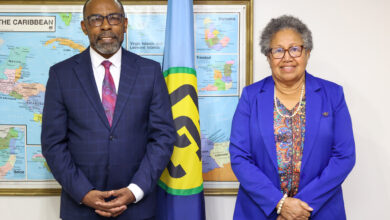Today, the Caribbean Community (CARICOM) joins with the rest of the world as it celebrates World Telecommunications Day and World Information Society Day. This celebration is recognition of the fact that as a global society we have continued to make significant progress in the fields of information and telecommunications in relatively short time.
Activities which shaped the emergence of the information society date back to 1994 with the call for international cooperation in building a Global Information Infrastructure (GII). It was a call for private investment, the provision of competitive services, flexible regulation, open access to network providers, and universal service. Given such a framework, it was predicted that a global community would emerge – one that shares information, affords improved education and healthcare, ensures democracy and economic progress, and effectively addresses local and global environmental problems. In short, create an improved quality of life for all.
Daily, we see the emergence of the information society which combines the benefits of a Global Information Infrastructure with connectivity and the creation of knowledge societies.
As we in CARICOM take advantage of this Day to reflect on what the Information Society means to us, as we strive to realise the dream of the CARICOM Single Market and Economy (CSME) by 2008, we are reminded that, as small island developing states, there are challenges we must overcome to integrate ourselves in the Information Society and avoid remaining on the periphery of the global economic and development processes.
Information and Communications Technologies (ICTs), which are the foundation of the Information Society, are acknowledged universally as powerful tools for development. ICTs are critical, not only for social development and economic growth, but also for the development of good governance, and our Region must take hold of their benefits now. The Region’s efforts to ensure that we remain significant, viable societies have caused us to focus on a number of priority areas to ensure the sustainability of our Member States. One of these priorities is connectivity. The Region represents a significant digital gap in this regard with the rest of the world.
In 2004, the Heads of Government adopted the Caribbean Knowledge and Learning Network (CKLN) as a regional project, confident that the objectives of the CKLN will advance us as a Region on the road to the Information Society. The direction of the CKLN, and of other programmes aimed at establishing a Caribbean Information Society, is guided by the Prime Minster of Grenada Dr the Hon Keith Mitchell, who, as Lead Head for Science and Technology in the Quasi-cabinet of the Conference of Heads of Government, champions the cause of connectivity and the establishment of a Caribbean information Society tirelessly.
Connectivity to the internet backbone is one of the pillars of the Information Society and will prove to be one of the singularly binding forces across the globe. Closer to home, the Region is actively involved with plans for one of our own binding activities, Cricket World Cup 2007 from 13 March 2007. We have already benefited through internet connectivity with respect to forging bonds with cricket enthusiasts and tourists from all over the world who expect to share in this global event.
The theme of World Telecommunications Day is Promoting Global Cyber Security. We are all aware of the impact of technology with regard to “access anywhere” but more particularly the rapid spawning of digital dossiers all across the world. While it is standard that Governments have an obligation to gather, keep, and disseminate information, we must also be reminded that there are persons and bodies who have unreasonable interest in access to that information. Cyber security must therefore be central to strategic planning at the national and regional levels, and must be tackled as a global partnership amongst governments and relevant stakeholders, particularly in light of the transnational nature of those crimes, as we continue in our strides for an equitable and transparent information society.
We must all work to ensure that we maintain the interests of our peoples, including consumer rights, privacy protection and right to information to ensure balance and to dispel negative forces.
The Information Society will only be of benefit to our citizens if we can offer assurances that the new Internet and information environment provides them with a measure of security among all its benefits.
As we continue our global pilgrimage towards the Millennium Development Goals (MDGs) and the realisation of the World Information Society let us bear in mind that, in the end, the development and welfare of our people are of paramount importance .




